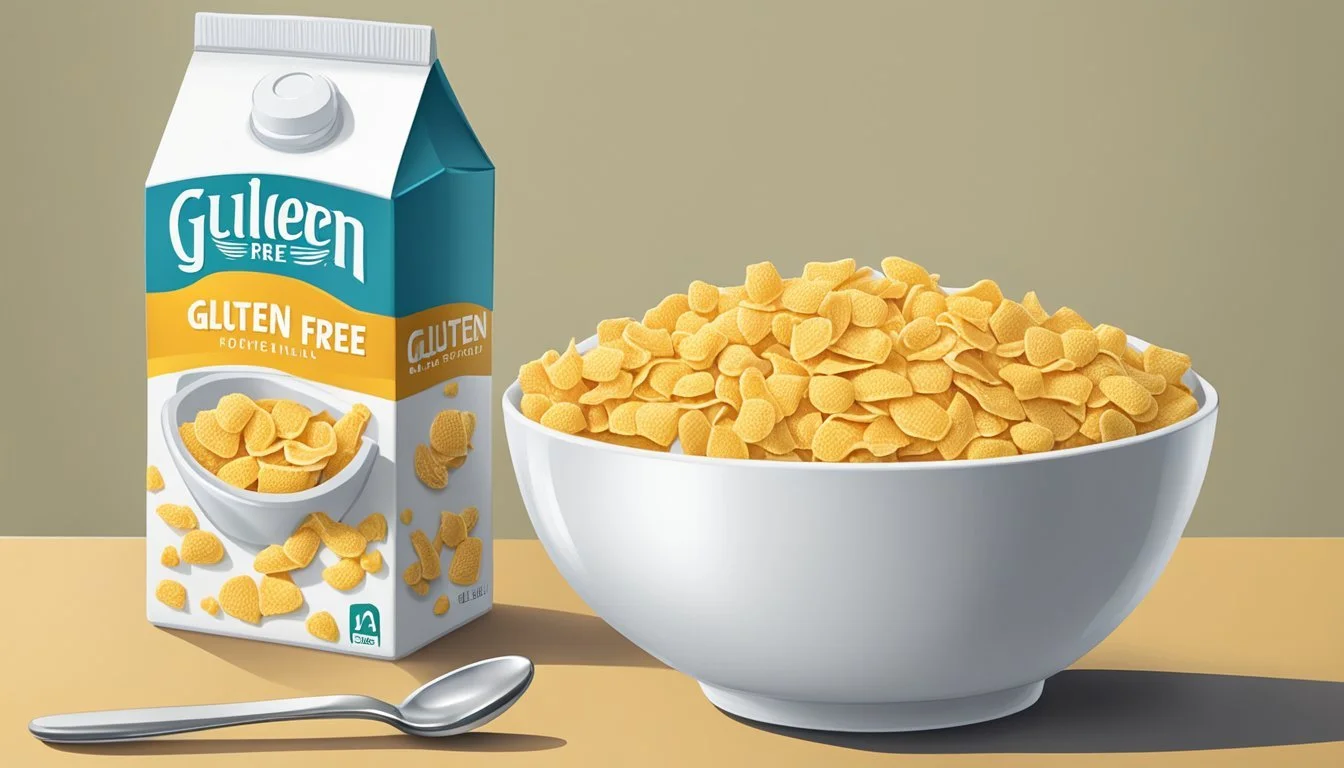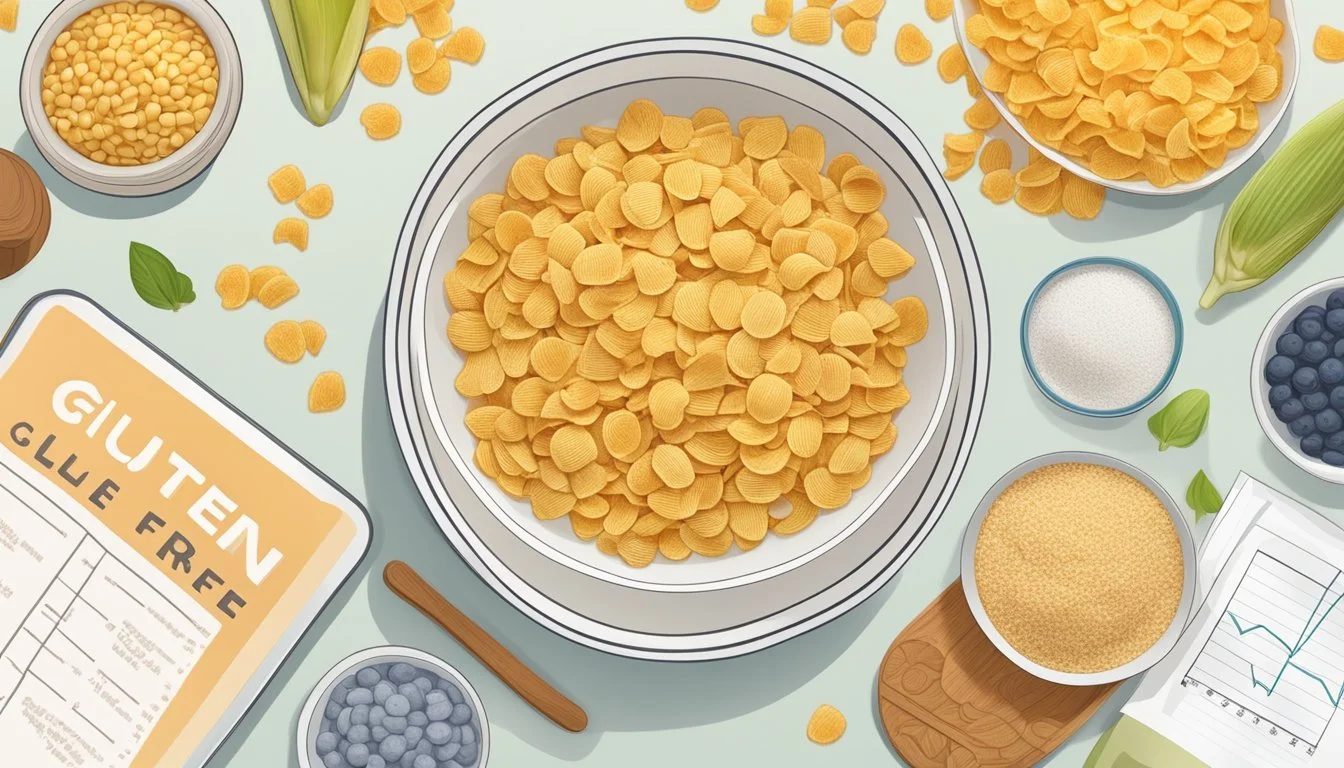Are Corn Flakes Gluten-Free?
Unpacking the Truth About This Breakfast Staple
Corn flakes, a popular breakfast cereal traditionally made from toasted flakes of corn, are often assumed to be gluten-free due to their primary ingredient being corn. However, it is important to note that not all corn flakes are free from gluten, a group of proteins found in wheat, barley, rye, and derivatives of these grains. Gluten can trigger adverse reactions in individuals with celiac disease or non-celiac gluten sensitivity, making it vital for these consumers to carefully select their cereals.
The confusion about the gluten-free status of corn flakes arises because some brands may include malt flavoring or other additives derived from barley, which contains gluten. As a result, certain mainstream corn flakes, including the original versions from Kellogg's, cannot be considered gluten-free. For those seeking gluten-free options, it is imperative to look for products that are specifically labeled as gluten-free. These varieties are produced to cater to the dietary needs of those avoiding gluten and are tested to ensure they meet regulatory standards for gluten-free labeling.
For consumers managing a gluten-free diet, alternative brands offer corn flakes validated to be gluten-free, such as Nature’s Path Organic Fruit Juice Corn Flakes and Nestle Go Free Corn Flakes. These products are tested to ensure they contain less than 20 parts per million of gluten, which is the threshold for gluten-free labeling in many regions. By choosing certified gluten-free corn flakes, individuals with gluten-related disorders can enjoy a safe and satisfying breakfast option.
Understanding Gluten
Gluten is a general name for the proteins found in wheat, barley, and rye. It has properties that affect elasticity in dough, helping it rise and maintain its shape. For individuals with gluten-related disorders, such as celiac disease or gluten sensitivity, adherence to a gluten-free diet is essential for health.
What Is Gluten?
Gluten is a combination of two main proteins: gliadin and glutenin, which are present in grains such as wheat, barley, and rye. These proteins play a crucial role in the structure of many baked goods, giving bread its chewy texture and pastries their fluffiness.
Celiac Disease and Gluten Sensitivity
Celiac Disease: This is an autoimmune disorder where ingestion of gluten leads to damage in the small intestine. It affects about 1% of the population globally. When people with celiac disease consume gluten, their body mounts an immune response that attacks the small intestine.
Gluten Sensitivity: Also known as non-celiac gluten sensitivity, this condition entails a negative reaction to gluten in individuals who do not have celiac disease. Symptoms may include gastrointestinal issues, headaches, fatigue, and joint pain.
Choosing a gluten-free diet is not only a lifestyle choice for some but a necessary approach for individuals with these conditions to maintain their health and well-being.
Corn Flakes and Gluten
Corn flakes are a popular breakfast cereal, but their gluten-free status can vary by brand and manufacturing processes. It's crucial for consumers seeking gluten-free options to understand the specifics of each product to ensure their dietary needs are met.
Are All Corn Flakes Gluten-Free?
Not all corn flakes are gluten-free. Although corn itself does not contain gluten, many corn flakes products have added ingredients, such as malt flavoring, which derives from barley, a gluten-containing grain. Additionally, cross-contamination during manufacturing can introduce gluten into corn flakes. Brands that do offer gluten-free corn flakes have strict protocols to prevent cross-contamination and verify their products meet gluten-free standards.
Gluten-Free Corn Flakes Brands:
General Mills' Corn Chex
Nature's Path Organic Fruit Juice Corn Flakes
Nestle Gluten-Free Corn Flakes
Identifying Hidden Gluten in Corn Flakes
Hidden gluten in corn flakes typically comes from two sources: malt flavoring and cross-contamination. Malt flavor, commonly added for sweetness, is made from barley malt, which is not gluten-free. Consumers should always look for a clear gluten-free label that indicates testing for gluten content, ensuring the product contains less than 20 parts per million (ppm) of gluten.
Signs of Hidden Gluten:
Presence of malt extract or barley malt on the ingredient list
Lack of a certified gluten-free label
Manufacturer warnings of potential cross-contamination
By reading labels carefully and choosing products from brands that are committed to gluten-free manufacturing, individuals can find safe and suitable corn flakes for their gluten-free diet.
Reading Labels for Gluten-Free Assurance
To confirm that corn flakes and other cereals meet the gluten-free needs of those with celiac disease or gluten sensitivities, it is essential to understand gluten-free labeling standards and recognize the risks of cross-contamination.
Gluten-Free Labeling Standards
Under the FDA's regulation, a "gluten-free" label indicates that a food product contains less than 20 parts per million (ppm) of gluten, the threshold scientifically proven to be safe for individuals with celiac disease. While reading labels, consumers should check for this designation on the package. It ensures the product adheres to specific guidelines which include:
Absence of any type of wheat, rye, barley, or crossbreeds of these grains
Not exceeding the 20 ppm of gluten threshold from any unavoidable presence of gluten in the food
Understanding Cross-Contamination Risks
Cross-contamination can occur at various stages, from harvesting to processing. It poses a significant threat to the integrity of gluten-free products. To limit this risk, consumers should:
Inspect the ingredient list for any mention of wheat, rye, barley, oats, or their derivatives, such as malt derived from barley.
Look for terms like "manufactured in a facility that also processes wheat," which may signal potential cross-contamination.
Opt for products from brands that have a Certified Gluten-Free label, signifying additional third-party testing and assurance that the best practices for avoiding cross-contamination are in place.
Contextual awareness of how gluten-free labeling and cross-contamination risks apply to products like corn flakes can help consumers make safe choices for their dietary needs.
Exploring Gluten-Free Corn Flake Brands
Identifying gluten-free corn flakes is essential for those with celiac disease or gluten sensitivity. This section highlights notable brands and options available that cater to gluten-free dietary needs.
Kellogg’s and Gluten-Free Options
Kellogg's has recognized the growing demand for gluten-free products. While traditional Kellogg’s Corn Flakes contain malt flavoring from barley, making them unsuitable for a gluten-free diet, the company offers a gluten-free version of its corn flakes in Australia. Consumers in the United States hoping to enjoy gluten-free corn flakes from Kellogg's, however, will need to look for alternative brands, as this particular product has not yet reached the U.S. market.
Other Notable Gluten-Free Corn Flake Brands
Consumers seeking gluten-free corn flakes have various options:
General Mills: Their Corn Chex cereal is advertised as gluten-free, excluding their Wheat Chex variety. They offer a range of Chex flavors, including chocolate, cinnamon, and honey nut, which can satisfy cravings for a crunchy, sweet breakfast.
Nestle's Go Free: Apart from being gluten-free, these corn flakes are kosher certified and enriched with vitamins and minerals. This brand holds the Coeliac UK mark of approval and is available for purchase on platforms like Amazon.
Nature's Path: Known for their range of organic and gluten-free cereals, Nature's Path offers a variety of options, including corn flakes, which are easily accessible at retailers like Whole Foods and Walmart.
Barbara's Bakery: This brand provides gluten-free corn flakes, catering to those who prioritize health and natural ingredients in their cereals.
EnviroKidz by Nature’s Path: Offers gluten-free and organic cereal options for children, extending the choices for families looking for healthier breakfast solutions.
Erewhon: They produce organic and gluten-free versions of traditional cereals, including corn flakes available in natural food stores and some supermarkets.
It is vital for consumers to check the packaging for gluten-free labels and certifications since manufacturing processes and ingredients can change.
Ingredients and Nutritional Information
Assessing the ingredients and nutritional content of corn flakes is crucial for consumers with specific dietary needs, such as those requiring gluten-free options.
Common Ingredients in Corn Flakes
Corn flakes typically include milled corn, sugar, and salt as their primary components. Some brands may incorporate a malt flavor, which is often derived from barley and contains gluten. Consumers seeking gluten-free options must verify that the malt flavor is absent or replaced with a gluten-free alternative. Ingredients like vitamins and minerals are frequently added to fortify the cereal.
Ingredients: Milled corn, sugar, salt, malt flavor (for non-gluten-free variants), vitamins and minerals.
Nutritional Values and Dietary Considerations
Corn flakes offer a variety of nutritional values that cater to different dietary needs.
Protein: Moderate amounts, important for muscle repair and growth.
Sugar: Present but levels vary between brands.
Salt: Used for flavor; consumers should be aware of their intake.
Vitamins and Minerals: Often added to enhance the nutritional profile.
Dietary Considerations: Those requiring gluten-free diets should choose brands that specifically label their products as such. For consumers looking for organic or non-GMO options, it's essential to check for these designations on the packaging.
Nutrient Description Protein Essential for various bodily functions, varies per serving Sugar Check for quantity, especially if managing blood sugar Salt Used in moderation for flavor Vitamins/Minerals Commonly added for nutritional benefits Dietary Specifics Options available for gluten-free, organic, and non-GMO
Products may also vary in suitability for a vegan diet depending on whether they contain animal-derived vitamins or additives. Consumers need to review the packaging to ensure compliance with their dietary preferences.
Considerations for a Gluten-Free Diet
When adopting a gluten-free diet, individuals must be vigilant in their product choices and aware of the health impacts of gluten. Those with conditions like celiac disease or gluten sensitivities must avoid gluten to maintain their well-being.
Choosing Safe Products for a Gluten-Free Diet
Consumers should scrutinize product labels for gluten-free certification to ensure safety. In the context of corn flakes, for example, only specific brands offer gluten-free versions, as standard corn flakes may contain traces of barley malt or other gluten-containing ingredients. By law, gluten-free labeled products in the U.S. must contain less than 20 parts per million of gluten. A Nima sensor can provide additional testing to verify the absence of gluten at home.
Label Reading: Always read product labels for gluten-free claims and ingredient disclosures.
Cross-Contamination: Be mindful of cross-contamination, which can occur during the manufacturing process or when sharing kitchen utensils and appliances.
Certifications: Look for third-party certifications from organizations like the Gluten-Free Certification Organization (GFCO).
Impact of Gluten on Health
Gluten can severely affect individuals with celiac disease, causing damage to the small intestine upon ingestion. It's crucial for them to follow a strict gluten-free diet to avoid long-term health consequences. Gluten intolerance and sensitivities can manifest in symptoms like bloating, headaches, and fatigue, making adherence to a gluten-free diet beneficial for those affected.
Celiac Disease: Gluten triggers an autoimmune response that damages the small intestine.
Gluten Intolerance/Sensitivities: Non-celiac gluten sensitivity causes discomfort but no intestinal damage.
Health Maintenance: A gluten-free diet is essential for managing symptoms and preventing complications.
Product Reviews and Recommendations
In this section, readers will find evaluations based on consumer feedback and professional taste tests, as well as guidance on top-rated gluten-free corn flake options.
Consumer Experiences and Taste Tests
Consumers generally regard gluten-free corn flakes as a satisfactory alternative to traditional corn flakes. Taste tests indicate that while some brands offer a comparable flavor to their gluten-containing counterparts, others may differ slightly in texture and taste. Amazon reviews of gluten-free corn flakes, such as Nestle Go Free Corn Flakes, often highlight customer satisfaction with the taste and likeness to non-gluten-free cereals. The Nature's Path Honey'd Corn Flakes receives commendation for its flavor, with many consumers expressing brand loyalty due to its consistent taste and quality.
Top-Rated Gluten-Free Corn Flakes
The market features a variety of gluten-free corn flakes that cater to different preferences. Below is a list of some top-rated gluten-free corn flakes, based on consumer ratings and nutritional content:
General Mills' Corn Chex:
Rating: High ratings for flavor and texture.
Nutritional Information: Contains vitamins and minerals, with a focus on being gluten-free.
Kellogg's Corn Flakes Gluten-Free (Available in Australia):
Rating: Favorably reviewed for closely matching the original's taste.
Nutritional Information: Similar to traditional corn flakes but without gluten.
Nestle Go Free Corn Flakes:
Rating: Well-received on Amazon; praised for taste and availability.
Nutritional Information: Fortified with vitamins and minerals; also kosher.
Nature's Path Organic Corn Flakes:
Rating: Positive feedback for being organic and tasty.
Nutritional Information: Organic, non-GMO, and gluten-free.
Great Value Corn Flakes:
Rating: Economic choice with satisfactory reviews.
Nutritional Information: Gluten-free and provides essential nutrients.
Amazon Frosted Flakes:
Rating: Generally reviewed with enthusiasm for their sweet taste.
Nutritional Information: Often reviewed for being a gluten-free sweet treat option.
These products offer gluten-free alternatives without compromising on taste according to consumer opinions. Rating and nutritional information can usually be found on the product's packaging or online listings, such as Amazon's website.
Shopping Guide for Gluten-Free Corn Flakes
When shopping for gluten-free corn flakes, consumers should focus on product labels, availability across various retailers, and the cost-effectiveness of their choice.
Where to Buy Gluten-Free Corn Flakes
Amazon: A convenient online marketplace where customers can find gluten-free corn flakes from a variety of brands. Shoppers can take advantage of user reviews and ratings to inform their purchases.
Whole Foods: Offers a selection of gluten-free corn flakes, often featuring organic options. Shoppers at Whole Foods can sometimes find exclusive brands that prioritize healthy ingredients.
Walmart: Known for its Great Value brand, which may offer budget-friendly gluten-free corn flakes. Walmart also stocks other brands and provides a wide distribution network for easy access.
Happy Belly: Available on Amazon and select retailers, Happy Belly products cater to those seeking gluten-free options with a focus on quality ingredients.
Consumers can check the online catalogs or visit physical stores of these retailers for the most up-to-date selection and availability.
Pricing and Value for Money
Brand Size Price Range Retailer Generic Brand Standard Box $ Low Walmart, Amazon Happy Belly Standard Box $$ Medium Amazon Organic Brand Standard Box $$$ High Whole Foods
To ensure value for money, shoppers should compare prices across different retailers and consider purchasing in bulk for additional savings. They should also review the price per ounce to understand the actual cost of the gluten-free corn flakes compared to the box size and number of servings.
Innovations and Market Trends
The landscape for gluten-free cereals is undergoing significant changes, with innovative brands and production trends shaping consumer choices. These developments cater to a growing demand for organic, non-GMO, and kosher options in the gluten-free segment.
Emerging Gluten-Free Cereal Brands
In the realm of gluten-free cereal brands, The Real Cereal Company has emerged as a noteworthy player, offering a range of organic and non-GMO corn flakes. Another brand gaining traction is Good & Gather Organic Frosty Flakes, which provides a gluten-free alternative with an emphasis on organic ingredients. Additionally, 365 Organic Corn Flakes has secured a place in the market by offering a certified organic, gluten-free cereal that appeals to health-conscious consumers.
The Real Cereal Company: Organic, Non-GMO
Good & Gather Organic Frosty Flakes: Organic, Gluten-Free
365 Organic Corn Flakes: Organic, Gluten-Free, Non-GMO
Trends in Gluten-Free Cereal Production
Production trends within the gluten-free cereal market show a clear shift towards transparency and health. Companies are increasingly spotlighting organic and non-GMO ingredients, as well as kosher certification, to meet consumer expectations. The trend is not just a passing fad but a response to a substantive consumer preference for cleaner, more transparent labeling and healthier cereal options. Consumers today are more inclined to choose products that not only meet their dietary restrictions but also align with broader values concerning wellness and environmental impact.
Focus on Organic Ingredients: Ensuring cereals are free from synthetic additives.
Non-GMO Commitment: Using ingredients that are not genetically modified.
Kosher Certification: Meeting the dietary standards of kosher-observant consumers.







